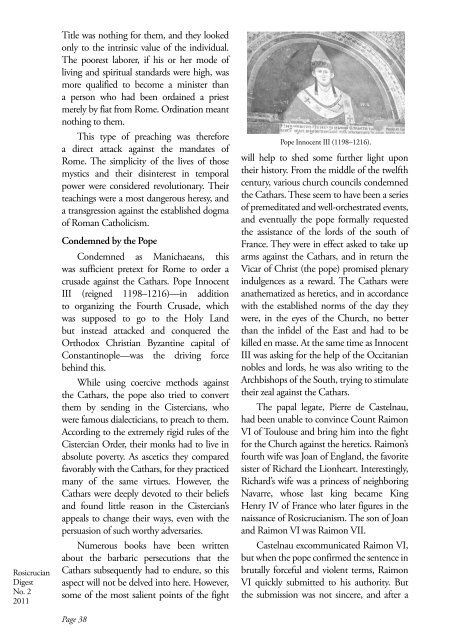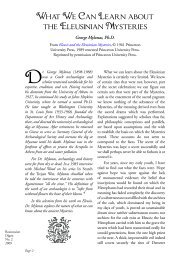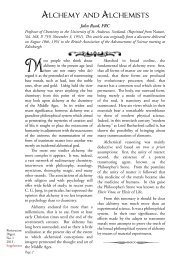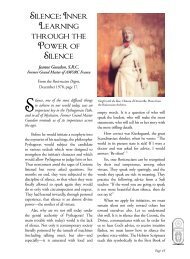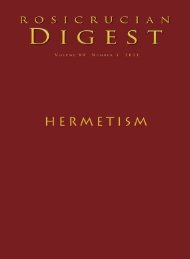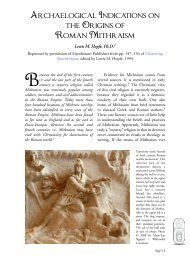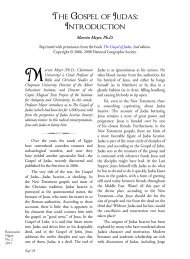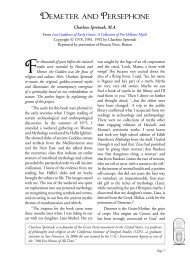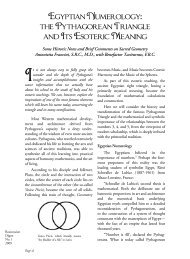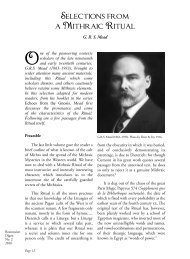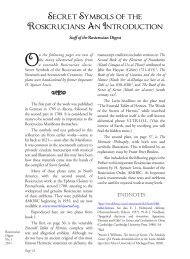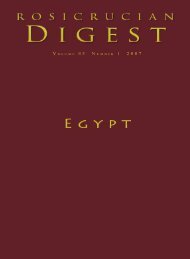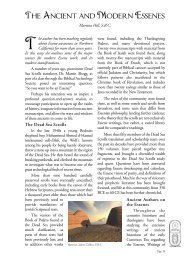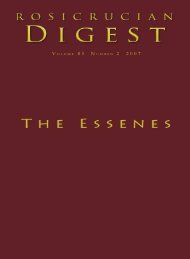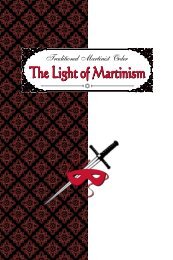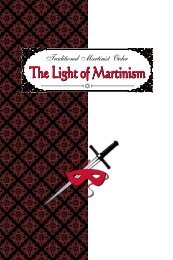Rosicrucian Digest Vol 89 No 2 2011 Gnosticism - Rosicrucian Order
Rosicrucian Digest Vol 89 No 2 2011 Gnosticism - Rosicrucian Order
Rosicrucian Digest Vol 89 No 2 2011 Gnosticism - Rosicrucian Order
You also want an ePaper? Increase the reach of your titles
YUMPU automatically turns print PDFs into web optimized ePapers that Google loves.
<strong>Rosicrucian</strong><br />
<strong>Digest</strong><br />
<strong>No</strong>. 2<br />
<strong>2011</strong><br />
Title was nothing for them, and they looked<br />
only to the intrinsic value of the individual.<br />
The poorest laborer, if his or her mode of<br />
living and spiritual standards were high, was<br />
more qualified to become a minister than<br />
a person who had been ordained a priest<br />
merely by fiat from Rome. Ordination meant<br />
nothing to them.<br />
This type of preaching was therefore<br />
a direct attack against the mandates of<br />
Rome. The simplicity of the lives of those<br />
mystics and their disinterest in temporal<br />
power were considered revolutionary. Their<br />
teachings were a most dangerous heresy, and<br />
a transgression against the established dogma<br />
of Roman Catholicism.<br />
Condemned by the Pope<br />
Condemned as Manichaeans, this<br />
was sufficient pretext for Rome to order a<br />
crusade against the Cathars. Pope Innocent<br />
III (reigned 1198–1216)—in addition<br />
to organizing the Fourth Crusade, which<br />
was supposed to go to the Holy Land<br />
but instead attacked and conquered the<br />
Orthodox Christian Byzantine capital of<br />
Constantinople—was the driving force<br />
behind this.<br />
While using coercive methods against<br />
the Cathars, the pope also tried to convert<br />
them by sending in the Cistercians, who<br />
were famous dialecticians, to preach to them.<br />
According to the extremely rigid rules of the<br />
Cistercian <strong>Order</strong>, their monks had to live in<br />
absolute poverty. As ascetics they compared<br />
favorably with the Cathars, for they practiced<br />
many of the same virtues. However, the<br />
Cathars were deeply devoted to their beliefs<br />
and found little reason in the Cistercian’s<br />
appeals to change their ways, even with the<br />
persuasion of such worthy adversaries.<br />
Numerous books have been written<br />
about the barbaric persecutions that the<br />
Cathars subsequently had to endure, so this<br />
aspect will not be delved into here. However,<br />
some of the most salient points of the fight<br />
Page 38<br />
Pope Innocent III (1198–1216).<br />
will help to shed some further light upon<br />
their history. From the middle of the twelfth<br />
century, various church councils condemned<br />
the Cathars. These seem to have been a series<br />
of premeditated and well-orchestrated events,<br />
and eventually the pope formally requested<br />
the assistance of the lords of the south of<br />
France. They were in effect asked to take up<br />
arms against the Cathars, and in return the<br />
Vicar of Christ (the pope) promised plenary<br />
indulgences as a reward. The Cathars were<br />
anathematized as heretics, and in accordance<br />
with the established norms of the day they<br />
were, in the eyes of the Church, no better<br />
than the infidel of the East and had to be<br />
killed en masse. At the same time as Innocent<br />
III was asking for the help of the Occitanian<br />
nobles and lords, he was also writing to the<br />
Archbishops of the South, trying to stimulate<br />
their zeal against the Cathars.<br />
The papal legate, Pierre de Castelnau,<br />
had been unable to convince Count Raimon<br />
VI of Toulouse and bring him into the fight<br />
for the Church against the heretics. Raimon’s<br />
fourth wife was Joan of England, the favorite<br />
sister of Richard the Lionheart. Interestingly,<br />
Richard’s wife was a princess of neighboring<br />
Navarre, whose last king became King<br />
Henry IV of France who later figures in the<br />
naissance of <strong>Rosicrucian</strong>ism. The son of Joan<br />
and Raimon VI was Raimon VII.<br />
Castelnau excommunicated Raimon VI,<br />
but when the pope confirmed the sentence in<br />
brutally forceful and violent terms, Raimon<br />
VI quickly submitted to his authority. But<br />
the submission was not sincere, and after a


